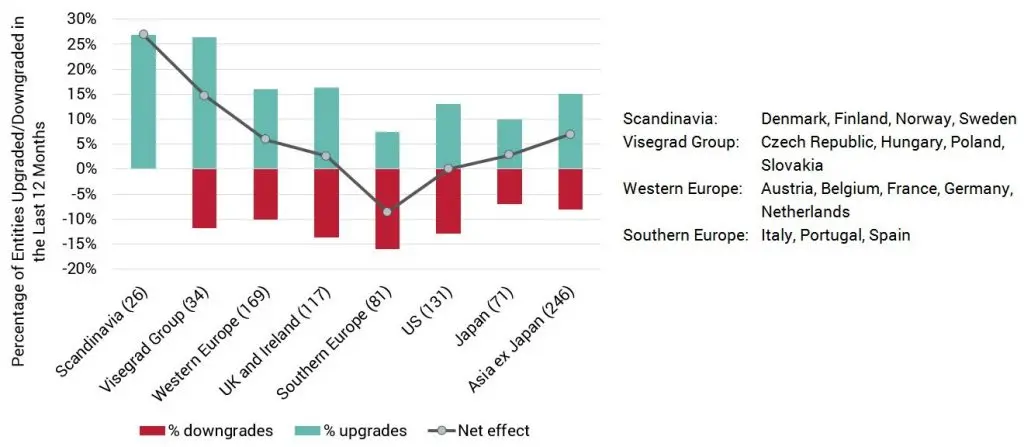Credit Benchmark brings together the credit risk assessments of the world’s leading banks to deliver greater visibility into the credit quality of individual entities. Today’s blog post looks at the banking sector, specifically Scandinavia, the Visegrad group (Central Europe), Western Europe, the UK and Ireland, the U.S., Japan and Asia ex. Japan.
Exhibit 1 compares the credit risk trends in the five European regions, US, Japan and rest of Asia based on the percentages of quorate and semi-quorate banks* that have been upgraded and downgraded over the last 12 months.
Exhibit 1 Percentage of Upgraded/Downgraded Entities in the Last 12 Months
The Credit Benchmark data shows that Scandinavian banks are the best performers, followed by the Visegrad region, Western Europe and the UK and Ireland. Across these regions, upgrades have outnumbered downgrades over the last 12 months. Southern Europe is an exception, being dominated by downgrades; although recent moves to recapitalize some of the Italian banks and an improving banking position in Spain may be bringing this phase to an end. Scandinavian banks are typically viewed as having very strong credit quality, reflecting their particularly cautious approach to maintaining capital adequacy. The improving credit position of the Visegrad region banks probably reflects recent strong economic growth and a low unemployment rate. Downgrades and upgrades in the US are in balance.
The ratio of upgrades to downgrades for Japanese banks is lower than in the rest of Asia, possibly due to a squeeze on bank net interest margins due to quantitative easing.
*Quorate entities have observations from 3 and more banks, semi-quorate entities are entities with observations from 2 banks.
Disclaimer: Credit Benchmark does not solicit any action based upon this report, which is not to be construed as an invitation to buy or sell any security or financial instrument. This report is not intended to provide personal investment advice and it does not take into account the investment objectives, financial situation and the particular needs of a particular person who may read this report.

